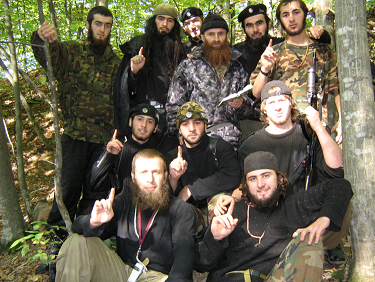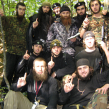
Chechnya Ordered To Be “Peaceful”
Publication: North Caucasus Weekly Volume: 10 Issue: 13
By:

Chechnya was back in the spotlight at the end of last week because of the announcements made by its president, Ramzan Kadyrov, with regard to the fate of the counter-terrorist operation in the republic. In the best traditions of the Soviet past, a number of events were intended to demonstrate that by the initiative of the regional leader, the federal authorities in Moscow make decisions instantly.
During a meeting with journalists on March 25, Ramzan Kadyrov stated that it was necessary to officially end the full-scale counter-terrorist operation, which has been carried out in Chechnya since the end of 1999 (Lenta.ru March 25). Kadyrov added that a corresponding announcement would be made in the final days of March. Thus, ten years after the deployment of Russian armed forces in Chechnya, a sudden realization dawned that it was necessary to end the military phase of the operation in Chechnya. The fact that this political decision by the Russian authorities was voiced by Kadyrov was initially understood as his personal opinion, which had not been agreed to by the Kremlin. This is why the Deputy Russian Interior Minister Arkady Yedelev was surprised by such a turn of events, saying it was the first he had heard of it (Interfax, March 26). In other words, it is not difficult to conclude that the decision was made at the level of a narrow circle of the political elite in Moscow. This was confirmed by the speaker of the Russian parliament, Boris Gryzlov, who stated that the issue would be discussed on March 31, at a meeting of the National Anti-Terrorist Committee (NAK) (Itar-Tass, March 26).
The Kremlin apparently hopes that this decision will help to turn a page in the Chechen war, which began in 1999. For the Russian state, the 10-year operation was more about tackling separatism rather than struggling against international terrorism, which is how Russian Prime Minister Vladimir Putin attempted to present it to the international community. This separatism could strike a deadly blow to the very existence of the Russian state. The bloody military campaign in Chechnya and across the North Caucasus could, in the Kremlin’s view, compel the nationalists to abstain from making demands that go beyond the framework of Russian federalism. Yet, entirely counterproductive results have been achieved in this regard, in the sense that the attitude in the national republics under the influence of the Chechen war assumed a new shape, one which is harsher with regard to the achievement of objectives.
By and large, the announcement will have little impact on the overall picture both in Chechnya and across the North Caucasian region.
The Moscow Carnegie Center expert Aleksei Malashenko thinks that the present decision to end the counter-terrorist operation could be related to the economic crisis, because by doing so the authorities are trying to reduce their burden of maintaining a large military presence in the region (https://www.newsru.com/russia/26mar2009/kadyrovmvd.html). Although there is certain logic in this, and the expert’s opinion is more in line with today’s world crisis and more comprehensible for the reader, it is nonetheless unlikely to explain the Russian reality in the North Caucasus.
There is undoubtedly an economic element in this issue, but it is related to the fact that for Kadyrov personally, the decision to end the counter-terrorist operation will lead to what he has been trying to achieve for so long. Gaining international status for the Grozny airport and having a full-scale customs operating in the republic (Yulia Latynina, “Kod Dostupa” [Access Code] program on the Radio Ekho Moskvy, March 28) will allow Kadyrov to import and export capital unimpeded, in direct circumvention of Moscow’s control. As a matter of fact, getting international status for the airport will allow the Chechen leader to fly abroad unimpeded and will also contribute to the local budget, as happened during the reign of Djokhar Dudaev, when the Grozny airport was the only strategically profitable facility in the Chechen economy.
It is not likely that foreign journalists will be allowed to travel to Chechnya with a regular Russian visa as a result of the official announcement of the cessation of counter-terrorist operation. At present, all journalists who want to travel to the region, apart from the general Russian visa, must also receive the visa with the special stamp “for the Northern Caucasus.” This special stamp, however, does not permit the right to visit Chechnya unless there is a special permit issued by the federal Interior Ministry and the Federal Security Service (FSB) specifically for the Chechen Republic. That is, there is a multi-step visa application process that in the end leads to the situation in which, without exception, journalists are simply gathered together and taken to Chechnya under the protection of either the FSB or the interior ministry. After reaching Chechnya under such conditions, the journalists discover that their movements are predetermined (with the mandatory stop at the hotel located in Kadyrov’s residential compound in Gudermes). Contact with the local population is expressly prohibited, with the exception of those who have been pre-screened by the authorities (usually members of the fan club “Ramzan,” representatives of the Edinaya Rossiya [United Russia] Party, as well as human rights activists from among those who collaborate with the authorities, and so on).
Even if we imagine that access to Chechnya will be made easier for journalists, the authorities surely hope that against the backdrop of grandiose construction projects in Chechnya, everything else will appear less negative than in previous years. It is more likely that the authorities in Moscow simply decided to declare the entire region off bounds without making official statements about launching new special operations. In other words, it is similar to how during the Soviet times the foreigners were duly informed that access to Chechnya was severely limited.
The authorities will also have something to hide because, according to the information provided by the human rights organization Memorial, the arsons of people’s homes related to members of armed underground continue unabated—as happened recently, for example, in the town of Shali, (https://www.kavkaz-uzel.ru/articles/151371). According to Memorial, since the summer of 2008, approximately 28 acts of arson have been registered. The arson attacks are carried out on the orders of the authorities for the purpose of pressuring relatives of those who remain with the resistance forces in the forests.
The head of Memorial, Oleg Orlov, says the counter-terrorist operation in Chechnya can be announced as completed not because terrorism has been defeated there, but because violence has simply been pushed out into the neighboring republics. According to Orlov, comparable numbers of casualties occur in the neighboring republics of Dagestan and Ingushetia even though those republics are not covered by the counter-terrorist operation. Still, the situation in Chechnya is far from peaceful: according to Kavkazky Uzel, a minimum of 97 policemen and servicemen were killed in the republic in 2008, and at least 138 wounded. There were 42 abductions and 50 casualties among the civilian population (including dead and wounded) last year, while the law-enforcement authorities and militants carried out, respectively, 73 military-police operations and 39 terrorist acts. All of this indicates that the assertion by pro-Moscow Chechen authorities that Chechnya is the most peaceful region—to put it mildly—does not correspond with reality (https://www.kavkaz-uzel.ru/articles/151359). If, under current conditions, Chechnya can be considered calm, then it is difficult to imagine what is happening in other regions of Russia.
In any case, the Chechen militants clearly did not interpret this call for cessation of the counter-terrorist operation as a sign to end the war. An interview given by the Chechen militant Aslan (nom de guerre Quteyb) from Hussein Gakaev’s detachment located in southern Chechnya to Radio Free Europe/Radio Liberty correspondent Andrei Babitsky testifies to the contrary. According to Aslan, about 60 militants operate in his sector alone and there are a total of twenty such sectors in Chechnya, which means that the estimate number of rebel fighters in Chechnya numbers around 1,200. Moreover, Aslan claimed that, according to the plans of the military command of the armed underground, the resistance forces will increase their activities in the month of April (www.watchdog.cz/index.php?show=000000-000005-00…).
The Chechen authorities are unable to completely conceal all the information about clashes with militants. For instance, one of the most recent armed clashes between the Russian law-enforcement authorities and militants in the vicinity of the village of Kurchaloi on March 29 left two resistance fighters dead (RIA Novosti, March 29). Not to mention the fact the Chechen authorities always report with pride the daily detention of this or that militant in the republic (https://www.rosbalt.ru/2009/03/29/629649.html).
Thus, it is impossible to end the war in the region simply with a Kremlin decree. That is why for the foreseeable future we will hear news reports about actions by militants against the Russian authorities from across the entire North Caucasian region, regardless of whether a counter-terrorist operation is formally still underway or not.




